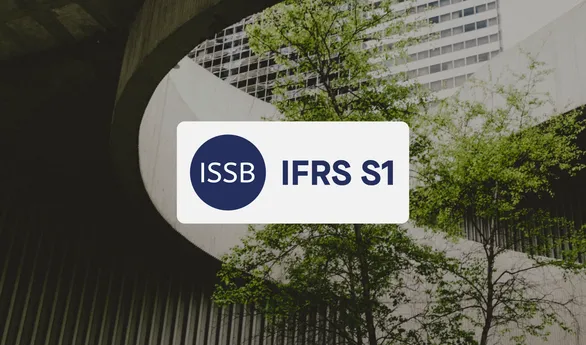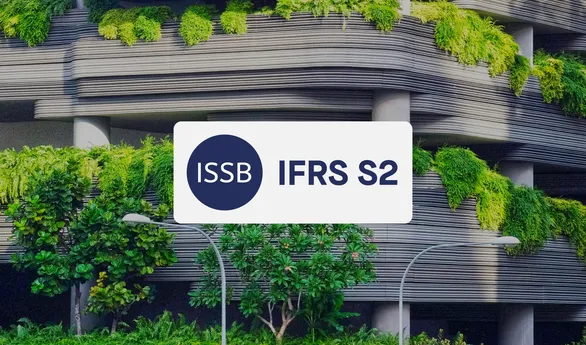The International Sustainability Standards Board (ISSB) is a global standard-setting body that aims to develop and promote a comprehensive global baseline for sustainability-related financial disclosures. The ISSB plays a crucial role in creating a standardized approach for sustainability reporting, helping companies provide consistent and transparent sustainability-related financial information.
The ISSB was established by the IFRS Foundation in November 2021 at the UN Climate Change Conference (COP26). The ISSB builds on the Value Reporting Foundation and other existing reporting frameworks to create a more efficient reporting landscape for companies and investors. The ISSB works closely with global regulators, businesses, and investors to ensure its standards align with financial markets’ needs.
What is the ISSB’s role?
The ISSB’s role is to address the fragmentation in sustainability matters by creating a standardized approach to sustainability-related financial disclosures. Investors and stakeholders have long sought a globally consistent framework that enables integrated reporting of sustainability risks and opportunities. The ISSB’s standards complement existing IFRS Foundation financial reporting standards to provide transparency and comparability across markets.
The ISSB is backed by the G20, the International Organisation of Securities Commissions (IOSCO), the Financial Stability Board, and the World Economic Forum. ISSB Chair Emmanuel Faber has stated, “We responded to capital market and G20 demand for a common language of investor-focused, sustainability-related disclosure, working diligently to deliver standards that fulfill the global baseline.”
The ISSB, also referred to as the Climate Disclosure Standards Board in some contexts, continues to refine its sustainability-related disclosure standards to align with global reporting requirements and investor needs.
What are the ISSB standards?
General sustainability disclosures (IFRS S1)
The IFRS Sustainability Disclosure Taxonomy includes IFRS S1, which establishes a universal structure for sustainability reporting.
IFRS S1 requires companies to disclose material sustainability matters, drawing from the Sustainability Accounting Standards Board (SASB) framework and integrating integrated reporting principles. Organizations must report on significant sustainability-related risks and opportunities, tailored to their sector. These disclosures must cover governance structures, sustainability-related risk management, and the financial impact of sustainability-related financial information on business operations.
The ISSB emphasizes that IFRS S1 is designed to be industry-agnostic, allowing companies across different sectors to use a common framework. The standard aims to ensure that sustainability-related financial disclosures align with investor needs, making it easier for stakeholders to assess companies’ long-term viability.
Climate disclosure standards (IFRS S2)
The IFRS S2 Climate-related Disclosures align with the Task Force on Climate-related Financial Disclosures (TCFD) framework. This standard requires organizations to disclose climate-related risks and opportunities based on governance, strategy, risk management, metrics, and targets.
IFRS S2 mandates organizations to assess their exposure to physical and transition climate risks. This includes:
- How climate-related risks affect their financial position and business model
- Climate risk mitigation strategies and adaptation plans
- Reporting on scope 1, 2, and 3 greenhouse gas emissions
- Financial resilience testing under different climate scenarios
- Disclosure of internal carbon pricing mechanisms
With IFRS S2, the ISSB aims to provide capital markets with clear and consistent climate-related financial disclosures, ensuring that investors can make informed decisions based on reliable and comparable sustainability-related financial information.

What are the ISSB’s mandatory metrics?
The ISSB requires organizations to report key sustainability metrics, including:
- Greenhouse gas emissions across Scope 1, 2, and 3
- Emission intensity linked to financial and operational performance
- Exposure to sustainability-related risks, covering both physical and transition risks
- Climate-related financial planning, outlining how sustainability risks impact financial performance
- Investment in climate action, detailing funds allocated to sustainability initiatives
- Internal carbon pricing, explaining how carbon pricing is integrated into decision-making
- Climate-related executive remuneration, indicating the link between executive pay and sustainability performance
What are the benefits of ISSB standards?
The ISSB’s role is to provide a comprehensive global baseline for sustainability disclosures, benefiting companies and investors by:
- Enhancing sustainability matters transparency and comparability
- Improving integrated reporting for ESG factors
- Aligning with the IFRS Foundation and Value Reporting Foundation standards
- Supporting capital markets in making informed decisions
What requirements does the ISSB have in terms of targets?
Companies must disclose:
- The nature of their targets, whether absolute or relative
- Baseline numbers used for measuring progress
- Time periods, distinguishing between interim and long-term targets
- Metrics for progress assessment, ensuring clear measurement
- Comparison with international agreements, such as the Paris Agreement
- Sectoral decarbonization approach, if applicable
- Third-party validation, confirming credibility
- Offsets accounting, detailing the use of carbon credits
How will the ISSB work with other standards?
The ISSB collaborates with global organizations to promote interoperability. This includes aligning with:
- Global Reporting Initiative (GRI) for sustainability disclosures
- European Sustainability Reporting Standards (ESRS) for regulatory compliance
- SASB Standards for sector-specific sustainability reporting
- IFRS Sustainability Disclosure Taxonomy to streamline reporting
What are the global implications of the ISSB?
The Corporate Sustainability Reporting Directive (CSRD) integrates ISSB standards but incorporates double materiality, ensuring companies assess both financial and societal sustainability impacts.
The UK government plans to adopt ISSB standards within company law and Financial Conduct Authority (FCA) requirements. The IFRS Foundation will play a key role in shaping disclosure rules.
Regulatory bodies, including the Canadian Securities Administrators (CSA), are aligning their frameworks with ISSB standards. Even regions with differing regulations recognize the ISSB’s importance in sustainability matters and investor expectations.
How can companies prepare for the ISSB?
Businesses should:
- Familiarize themselves with ISSB’s frameworks, including IFRS Sustainability Disclosure Taxonomy
- Assess current sustainability disclosures and align with ISSB requirements
- Improve data collection on sustainability matters
- Establish robust governance for sustainability reporting
- Leverage Value Reporting Foundation guidelines for better alignment
How can sustainability software support ISSB data collection?
As ISSB standards require detailed and structured sustainability-related financial disclosures, companies need efficient tools to manage data collection and reporting. Sustainability software can support ISSB compliance by:
- Automating data gathering from various business operations
- Ensuring alignment with IFRS Sustainability Disclosure Standards
- Providing real-time tracking of sustainability performance
- Facilitating accurate reporting of ISSB-mandated sustainability metrics
- Enhancing risk assessment and scenario analysis for climate-related disclosures
By leveraging sustainability software, companies can streamline their reporting processes and ensure compliance with ISSB requirements while improving the quality and reliability of sustainability-related financial information.



